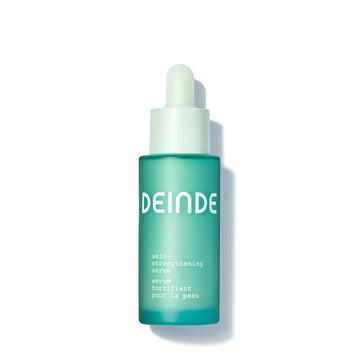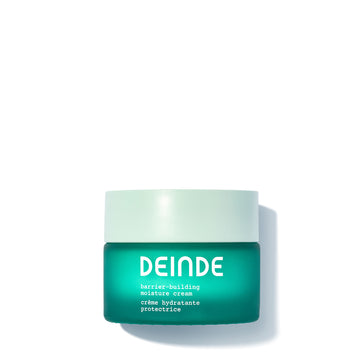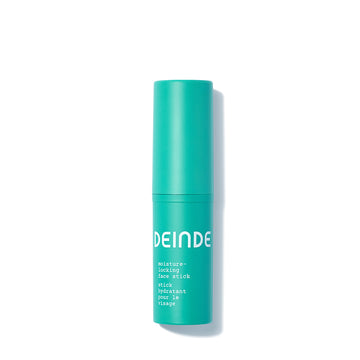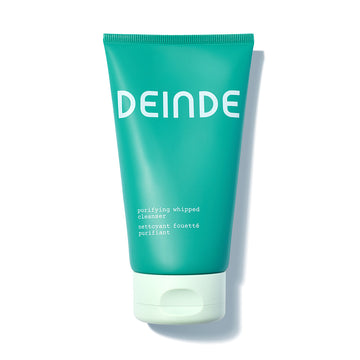
How To Choose the Best Face Serum for You
It’s no secret that in today’s world of skincare, the options for face serums are a-plenty. With so many different products, brands, and ingredients, determining which face serum is right for you can be a daunting task—one that feels so overwhelming that you might even just give up and go serum-less. (We do not recommend going serum-less!)
Shopping for a face serum does not need to be a dark, dull, and dreary prospect. After all, face serums are all about brightening up your glow. With the right understanding of your own skin type, your specific skin concerns, and common face serum ingredients, you will be armed with everything you need to make the right decision. Once you pick your serum, it’s important to ensure the serum works well within your overall skincare regimen. At DEINDE, for example, our skin-strengthening serum formula is biotech-derived and made to complement our purifying whipped cleanser and moisture-locking face stick.
Choosing a face serum is a little like voting in a local election—you know that it matters (it does, please vote!), but without a strong understanding of the specifics, it can be hard to cast a vote. So here are our recommended steps for choosing a face serum:
1. First, know your skin type.
This is a common mandate in the world of skincare because so many micro-decisions stem from knowing the general tendencies of your skin. We tend to all fall into four categories of skin types: oily skin, dry skin, combination skin, or sensitive skin. Of course, your skin can have elements of each type, but when you think of your face’s usual challenges, they probably skew a certain direction. Knowing if your skin is oily, dry, combination, or sensitive can help you down the line as you look into ingredients.
If you have oily skin, for example, you may want to look for a facial serum with active ingredients like salicylic acid or niacinamide. Ingredients like these can help to control excess oil production, allowing the face serum to do its work without causing more chaos than it is helping to heal.
If you have dry skin, on the other hand, you might want to opt for hydrating serums that are infused with more ingredients (makes literal sense, no?). People who tend to have dry skin might want to look for ingredients like hyaluronic acid or glycerin to help replenish moisture levels.
Some face serums are formulated to work well across a broad range of skin types, including combination and sensitive skin. DEINDE’s skin-strengthening serum is one of these do-it-all face serums that works gently across all skin types. If you’re new to using a face serum, or you’ve found that it’s time to revamp your regimen, you might want to consider using a serum that works well for various skin types. That way, you don’t end up pigeonholing yourself.
2. Next, determine what you want the face serum to do for your skin.
This can be a difficult step. It’s like when your therapist asks, “Hmm… well… what exactly is the problem then?” and suddenly you feel like you both have no problems and all the problems in the world at once.
You are probably in search of a face serum because you have some complaints you’d like to lodge about your skin’s health, radiance, and strength. So, what’s on your mind? Face serums, specifically, help to target five common signs of inflammaging, like fine lines, dullness, uneven tone, dryness, and uneven texture.
Asking yourself about your specific concerns can help you to identify ingredients and formulations that are a special fit for your skin. For example, there are some serums that may focus on breakouts , aging, hyperpigmentation and dark spots, or dullness—while others take a more comprehensive approach.
Depending on your specific area of concern, you may feel drawn to a certain type of ingredient. If you are concerned with skin aging, you might want to look for a formulation that includes retinol. On the other hand, Vitamin C can help to brighten and even out skin tone, making it an excellent ingredient to look for if you are concerned with dullness, sun damage and free radicals, or uneven skin tone.
Face serums tend to occupy the “treating” stage of a basic three-step skincare regimen (in addition to cleansing and moisturizing). The best face serums are meant to target your skincare concerns in a lightweight and soothing fashion, without making your skin overly oily or dry. This can be a hard balance to strike, of course.
We recommend looking for serums that target all the signs of inflammaging—or the chronic, low-level stress that your skin endures every day. By choosing a face serum that targets all the causes of inflammaging, you are more likely to address your primary concerns.
3. Put all you know to the test by, yes… reading the ingredient list.
It can be easy to grab for a skincare brand that you’ve heard of and trust that the ingredients are going to work wonders for you. As a science-focused company with biotech-engineered products, we at DEINDE recommend considering the other option—reading the label entirely.
When it comes to face serums, you will want to look for key ingredients that offer the specific skincare benefits you’re looking for without any potential irritants or allergens. Additionally, be wary of potentially harmful ingredients such as parabens, sulfates, and artificial fragrances, which may irritate the skin or cause adverse reactions.
As you build up your understanding of ingredients, you will be better able to spot ingredients that agree (or disagree!) with your skin in the future. Here are some common ingredients you may find as you choose a face serum:
-
Hyaluronic Acid: Known for its hydrating properties, hyaluronic acid helps plump and moisturize the skin, reducing the appearance of fine lines and wrinkles.
-
Vitamin C: You know it. Your immune system loves it. A powerful antioxidant, vitamin C brightens the skin, evens out tone, and protects against environmental damage.
- Retinol: You’ve probably seen this one around, too. Derived from vitamin A, retinol promotes cell turnover, stimulates collagen production, and diminishes the look of signs of aging, such as wrinkles and fine lines.
- Niacinamide: Also known as vitamin B3, niacinamide helps improve uneven skin texture, minimize the look of pores, and support balanced oil production, making it ideal for oily and acne-prone skin. You will find niacinamide in DEINDE’s skin-strengthening serum.
- Peptides: These amino acid compounds help firm and tighten the skin, reducing sagging and improving overall elasticity. There is a biomimetic tripeptide in our serum, which helps to support natural collagen production.
When choosing the best face serum for your skin, you may want to look toward powerful ingredients that are not often found in your everyday brand.
DEINDE’s skin-strengthening serum, for example, is powered by Naringenin: a patented polyphenol that is clinically proven to outperform the leading comparable active by strengthening skin against environmental stressors and sustaining moisture and elasticity. Naringenin is also found in our moisture-locking face stick, which helps to lock in all the work that your serum does in balancing your skin texture and tone.
4. Choose your fighter.
Every formulation is unique in weight and feel. Once you feel aligned with the types of ingredients that you will deploy during the serum stage of your routine, begin to consider what texture and consistency you want from your serum.
Face serums come in various formulations and textures, ranging from lightweight liquids to rich creams. Again, if you have oily or acne-prone skin, you might want to opt for lightweight, non-comedogenic skincare products that won't clog pores, cause blemishes, or feel greasy on the skin. On the other hand, if you have dry skin, you may prefer richer serums that provide a little more nourishment. Experiment with different textures to find the one that feels comfortable—and the one that absorbs well into your skin.
5. Test it.
Again, we love science.
Before you dive into your new routine, give your serum a quick spot test to ensure you do not experience any adverse responses or sensitivities. You can even try applying the serum on your wrist or the side of your neck before applying it to your face.
If you have any semblance of a negative response, discontinue use immediately. Otherwise, you’re good to give your new serum a try. As always when starting a new skincare routine, feel free to consult with a licensed skin health professional like a dermatologist.
Of course, face serums can take some time to start yielding their full benefits—potentially between six and eight weeks! Once you start using a face serum, consistency is key. Give the serum a chance to shine—and yourself a chance to glow!
6. Incorporate the serum into your everyday skincare routine.
Serums are typically integrated into a skincare routine after cleansing and before moisturizing. This process allows the serum to first absorb and penetrate deeply into the skin, and then stay locked in for the rest of the day.
Most face serums can be applied once or twice a day, in the morning or in the evening. As you adapt your skincare routine, be patient for results to show up over time. But it won’t take forever. For example, in clinical trials of DEINDE’s skin-strengthening serum, 100% of users had healthier and more supple skin in just four weeks.*
This is all to say, choosing the best face serum for your skincare needs doesn’t have to overwhelm you. There are a few simple ingredients for which you can be on the lookout: niacinamide, Naringenin, peptides, etc. Otherwise, you’ll do right by yourself by merely becoming more aware of your skin’s natural tendencies, and looking for powerful ingredients that target the signs of inflammaging.
With a little bit of foundational knowledge and intentionality, you can reap all the benefits of an effective face serum.
*Based on a clinical study across 36 people using instrumentation, VISIA photography, expert grading, and consumer perception. Participants used skin-strengthening serum twice daily.
Sources:
Efficacy and Tolerability of a Facial Serum for Fine Lines, Wrinkles, and Photodamaged Skin | PMC
Efficacy Evaluation of a Topical Hyaluronic Acid Serum in Facial Photoaging | PMC
Hyaluronic acid: A key molecule in skin aging | PMC
Niacinamide - mechanisms of action and its topical use in dermatology | NCBI








